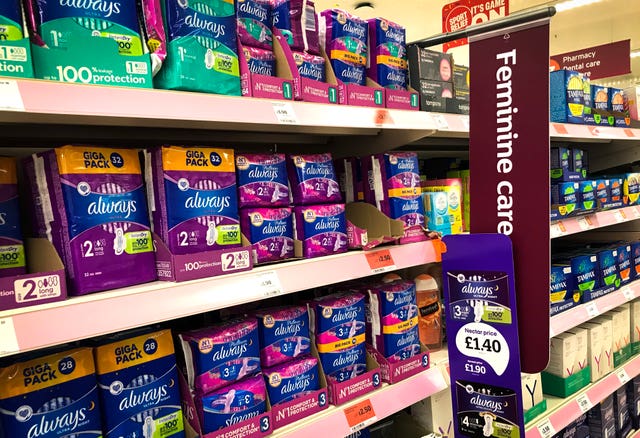
Nearly a quarter (24%) of women who menstruate in the UK said they or their family have struggled to afford period products in the last year, new research shows.
As the cost-of-living crisis continues to worsen, a new survey by WaterAid has highlighted the concerning impacts this can have for women on their period.
While significant steps have been made to tackle period poverty in the UK, most notably with the abolition of the tampon tax in January 2021 and provision of free period products in schools and hospitals, 83% of survey respondents said more needs to be done.
The international charity surveyed 2,000 British women and non-binary people who menstruate aged 14 to 50 and found that nearly a third (32%) are concerned they will not be able to afford period products in the future.

Consequently, they uncovered the ways respondents are being forced to reduce costs.
They found that one in four (26%) are wearing period products for longer than they should, risking their health.
An additional one in five (20%) are coping by using makeshift materials such as toilet paper or sponges.
An anonymous respondent said: “I am using the cheapest toilet roll I can find to use for periods. It’s not hygienic or recommended, but it’s all I can afford.”
With Menstrual Hygiene Day coming up on May 28, the international charity is calling for menstrual health to be recognised as critical for gender equality, so no-one is unfairly held back during their period.
School-aged girls are among the hardest hit, with two in five (41%) worrying about adding to the financial burden of their parents or caregiver, and one in five (20%) admitting missing school or work as a result of struggling to afford period products.
Added to this, the charity reported that a third of schools lack decent toilets, meaning many girls miss classes during their periods.
One student said cheaper period products would improve their mental health because they “wouldn’t have the worry of keeping money aside”.
She said: “I wouldn’t worry about the fact that I might not be able to afford period products for my next period which would mean I would miss work and university.”
The charity’s poll also found that, in the last year, 22% of British women and girls have relied on free period products from work, school, a food bank or other charity, while 30% have had to choose cheaper brands to cut costs.
Nearly a quarter (24%) reported missing activities such as sport or social activities due to struggles with affording period products.
More than three-fifths (61%) said if period products were cheaper or more free products were available, it would improve their mental health or wellbeing.
A separate survey by Plan International UK found that girls and young women are using toilet paper, socks, newspaper and other fabric because they cannot afford sanitary products.
Almost a fifth (19%) have been unable to afford period products at all this year, while one in 10 of the 1,000 UK respondents used a food bank to get what they needed.
The May poll found that half of girls who struggled to afford period products since the start of 2022 had to cut back on food and groceries to be able to buy them – almost double compared with last year.
More than a quarter are worried about how they will afford sanitary products over the coming months amid the ongoing cost-of-living crisis.
Chief executive Rose Caldwell said: “It is devastating that so many girls and young people in the UK are unable to afford the period products they need, and that shockingly high numbers of them are forced to rely on toilet paper as a substitute.
“Of even more concern, half of girls who struggle to afford period products report cutting back on food to be able to buy them, almost doubling compared to last year.
“As we look to an uncertain future, many more families will face tough financial choices, and more young women than ever are likely to face issues affording the products they need. Period products are a necessity, not a luxury, and they need to be treated as such.”
A Government spokesman said: “The Government has taken a number of steps to ensure that sanitary products are available and affordable for all who need them, including scrapping VAT, and rolling out free period products to colleges, schools and hospitals.”


Comments: Our rules
We want our comments to be a lively and valuable part of our community - a place where readers can debate and engage with the most important local issues. The ability to comment on our stories is a privilege, not a right, however, and that privilege may be withdrawn if it is abused or misused.
Please report any comments that break our rules.
Read the rules here